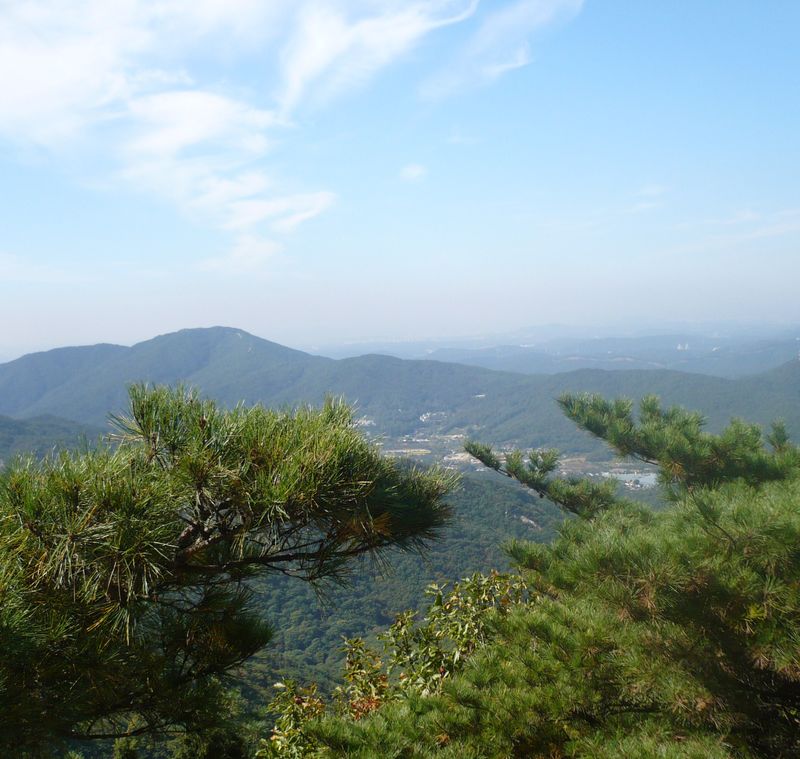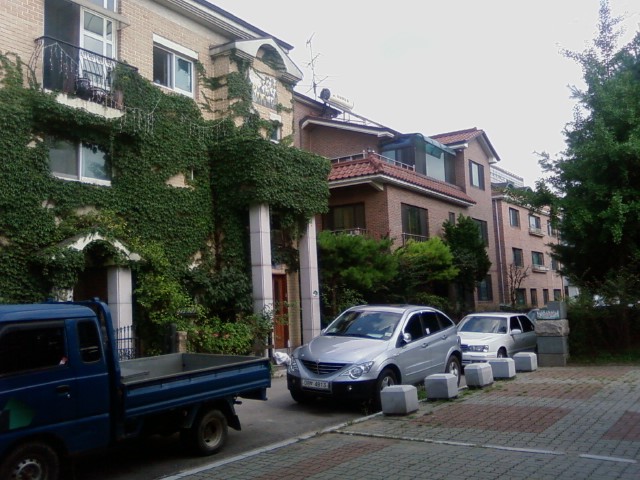
What does it mean that a mostly Buddhist and Christian nation lives nationalistically under a flag composed of Taoist and Confucian/Pagan symbols?
The giant flag at Juyeop plaza, one subway stop west of my “home” station at Jeongbalsan, and a short 7 minute walk from my place of work. I took the picture after leaving work early on New Year’s Eve. The day was bright, windy, and very, very cold. Maybe around 15 F (-10 C).
![]()
Category: My Photos
Caveat: 새해복많이 받으세요
My student Eunice sent me a text message sometime after midnight last night (above). Roughly, it means “Happy New Year,” of course. Don’t my students have anything better to do? Hah… no, seriously, it was nice of her to do that, I guess. I haven’t had a very productive day today, though.
The random picture shows sunset in Gangnam.
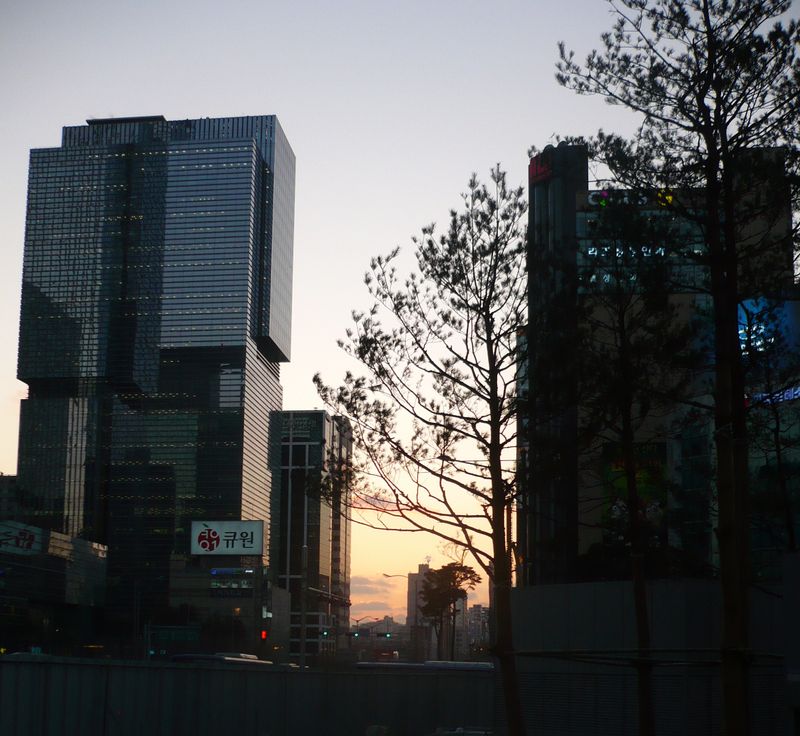
![]()
Caveat: 13 Stone
I have a bathroom scale I bought for 12000 won at the Home Plus store. Apparently it was a leftover something originally intended for the U.K. market, as the weight is marked in stone and kilograms, but not pounds. According to that scale, I started the year 2008 with a weight of just a little over 13 stone, and I’m ending the year roughly the same.
That may seem inconsequential. And 13 stone and a fraction (it’s about 84 kg or 185 pounds, I think) is still more than my ideal weight, probably. But it’s really a major accomplishment for me to have kept my weight so stable this year, given it was only a few years ago (I think 2003 or 2004) when I peaked at around 245 pounds, and that my long-term year-from-year weight hasn’t shown a lot of stability, having mostly fluctuated between 200 and 250 over the last 15 years. So keeping it so stable, and at well under 200, feels like a major accomplishment to me. And basically, I have only one rule: “Eat less than you want. Always.”
Anyway, that’s my observation for this last day of the year. I have tomorrow off. No big plans, though. I ran across the following quote in an old file of snippets and notes of mine, but can’t figure out where I might have found it… I’m pretty sure it’s not mine. But I definitely think there’s something to it.
“Forget about all those years of therapy, just pretend you’re okay and you will be.” – unattributed.
The random picture below shows the changing of the guard (i.e. change of drivers) at the Jichuk station on the Orange Line of the subway, on a Daehwa-bound train – which is what I take from downtown Seoul to my home.
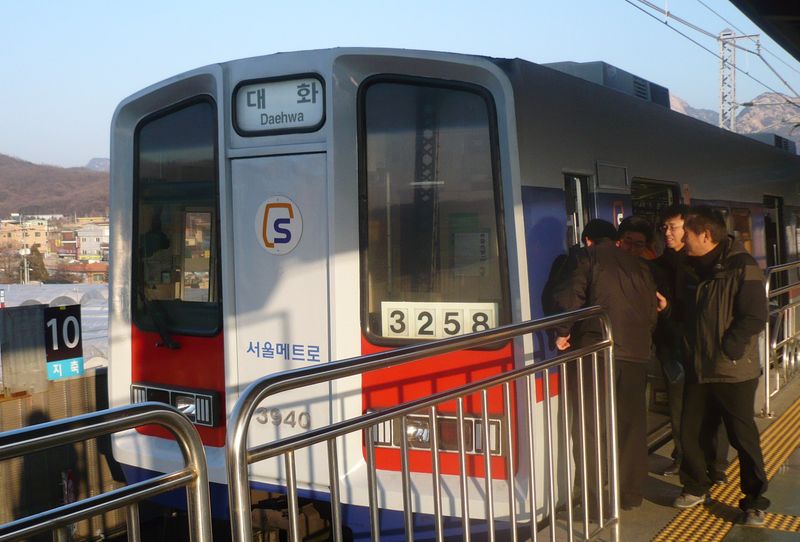
![]()
Caveat: 고맙습니다
Because it’s that day.
Misty rainy cold day, and man squats under umbrella working at a manhole.
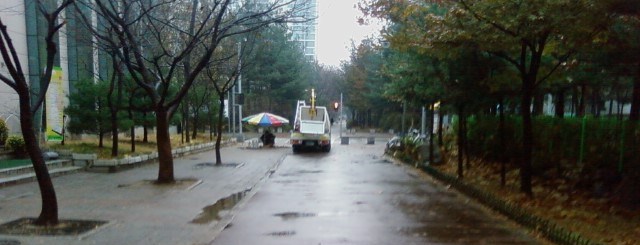
These are the Indigo kids: James (with alligator), Kelly K, Olivia, Brian, Amy, Flora, Sally, Jessica (강도!), Kelly L (from LF!), Crazy David.
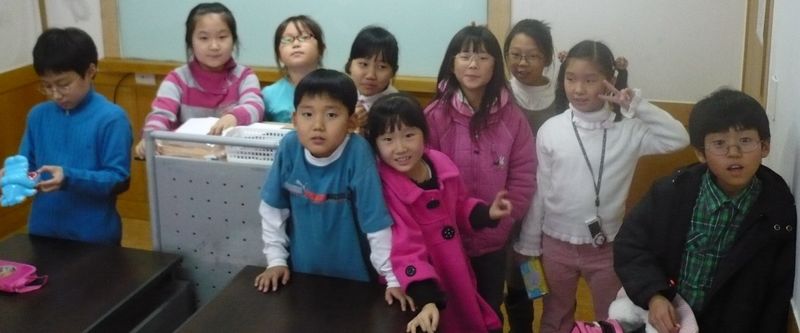
Violets: Gina, James, Jin, Stephanie (from LF!), Paul, Tammy.
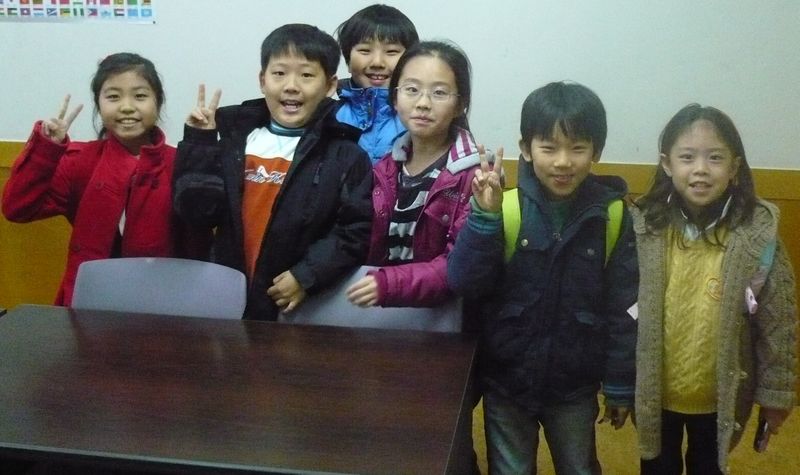
The Awesome E2M2: Jimmy, Max, Andy, Willy, Sally, Irene, Scarlet, Cindy, Sarah, Floating Jay (in front).
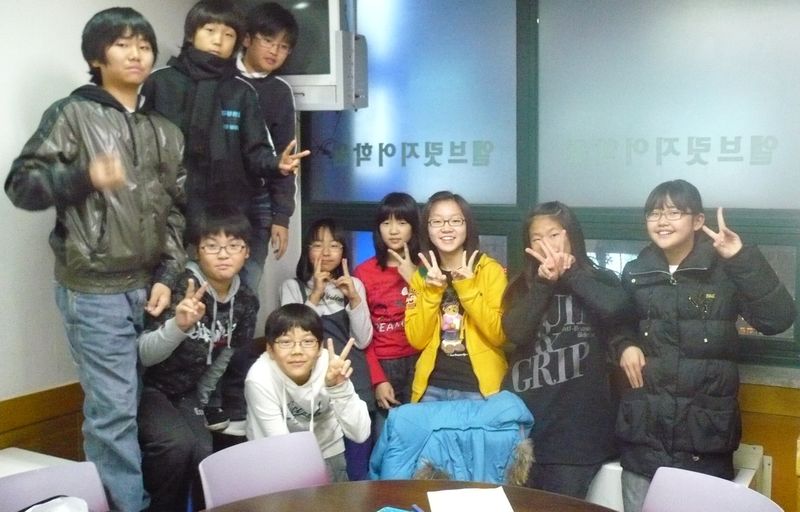
The E1bM2: Anastasia, Kevin (hiding), bad-boy David, whats-my-homework John, Jack.
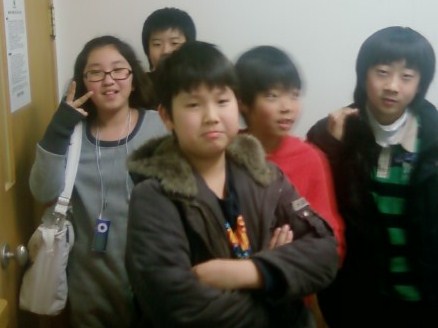
The Library Zombies: Richard, Annie, Ella, Hana (boggle boggle sorinae!).
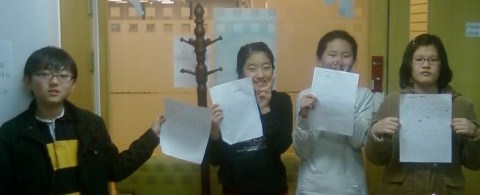
The boys from “Worst Class Ever”: Yosep, Pete, Cooper.
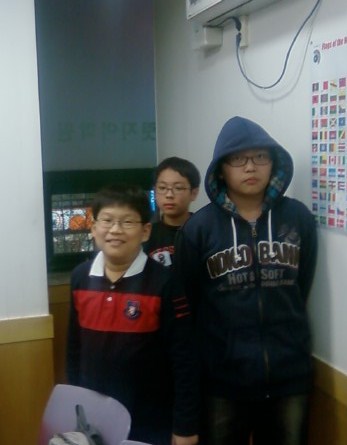
The girls from “Worst Class Ever”: Minerva, Ellen, Jenis, Lynn, Ally, Lydia.
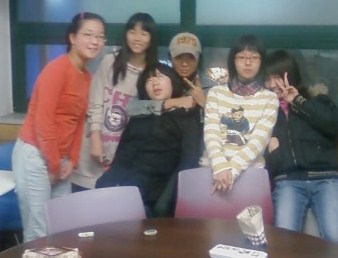
![]()
Caveat: Stab it with your kkochistick
 I was walking home with Basil and we were going to stop and buy some chicken-on-a-stick (kkochi), and I saw this decimated kkochistick, with its tiny napkin-banner blowing in the wind, stuck into a tree like the spear of some insane tribesman, leaving a warning to unwary travelers.
I was walking home with Basil and we were going to stop and buy some chicken-on-a-stick (kkochi), and I saw this decimated kkochistick, with its tiny napkin-banner blowing in the wind, stuck into a tree like the spear of some insane tribesman, leaving a warning to unwary travelers.
I took a picture with my cellphone.
Today was “first snow,” although there wasn’t much… and it kept turning back to rain, so of course nothing stuck. It sure is beautiful, invigorating weather, though. I really love it.
Koreans view “first snow” as a significant event. The kids celebrate it with excitement, and one of our coworkers ran out and bought treats for everyone. I think it’s a fabulous tradition.
I came home and had some rice with spicy instant soup for dinner, and made some ginger tea.
I’ve been thinking about respect.
In the West, respect is something that’s earned. And it can be easily lost.
In the East, I think, respect is something each person is due based on his or her position in the social hierarchy (basically matters of age and, in employment, the chain-of-command). Thus, no one can “lose” respect, ever. Perhaps it could be summed up with a phrase such as, “I have been utterly shamed [or hurt, wounded, etc.] by you, but I still must respect you.”
I think that misunderstandings of how respect works differently may be one of the main causes of disillusionment on the part of Westerners working in Korea, and may be one of the main reasons why Korean bosses view Western employees as impudent, rude, or downright lazy, too. I have never seen my boss more confused and at a loss as when I was trying to explain to him the idea of “earned respect.” And he’s someone who has, in fact, spent time in the U.S. How must it be for Koreans who have never had that experience?
![]()
Caveat: Rainforest
The picture is of a quilt made by my mother. She explains that it is “a copy (interpretation / based on) an illustration by William T. Cooper from Visions of a Rainforest by Stanley Breeden, I suspect you need to attribute it to him.”
So there’s the attribution. I like it… and it shows she’s pretty talented, too; it’s hard to imagine that that is a quilt, from the picture. Pretty cool.

![]()
Caveat: 떡볶이 Yum!
I worked for about 4 hours today. I walked to work amid the crisp air and fall leaves, and took this picture on the path amid the apartment blocks where typically go. When I was walking home, I stopped at a stand and bought some 떡볶이. This particular variety included the basic sliced tubular-shaped rice-cakes, in a slightly sweet red chili pepper sauce with 오뎅 (sliced fish cake, a kind of fish sausagy thing, same as 어묵?). I took it home and ate it with some real cheese I’d bought the other day. Unconventional combination, but delicious.
I then went off to surf comedy web videos. I witnessed the following scene, in which Governor Palin is played by none other than that spiffy satarist, ObamaGirl. I realize that now that the election has occurred, this is old news. But after the little clip ended, I laughed for a long time. Not sure why.
Putin: I’ve come to take Alaska back, for Mother Russia.
Palin: Not on my watch! [She does brutal judo moves on his ass, giving him a bloody nose – this is ironic, given that Putin holds a black belt in judo]
Putin: [grinning] You have strooong thighs, like Russian bear.
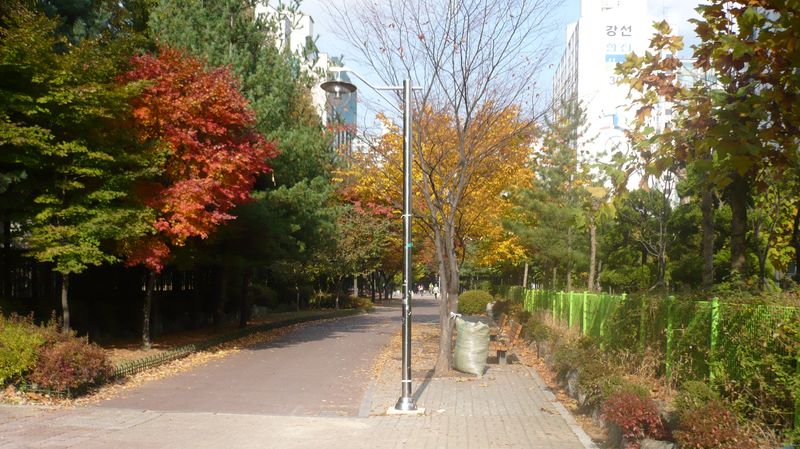
![]()
Caveat: Foggy… Guilty… Gold, Falling Leaves.
It’s a rare foggy night in Ilsan. And somewhere along the way, it suddenly became deep autumn: the trees are all turning yellow and gold fast, and leaves are piling up on the sidewalks.
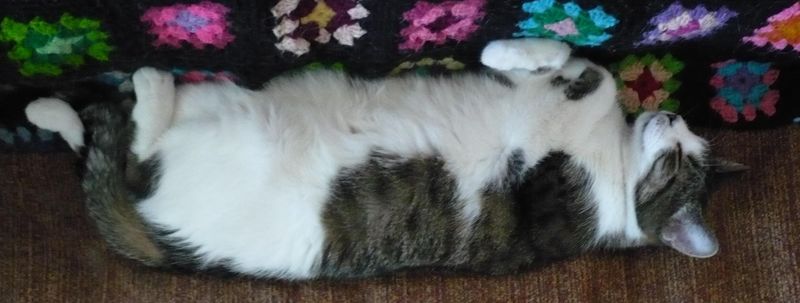
I dreamed about my cat (ex-cat?) Bernie, last night. It was sad, as yesterday I’d gotten an email from my brother (who shares partial custody of her, I guess you might say, with my father), saying that she was seeming sick, and so he’s taking her to the vet.
In my dream, I was visiting some people (unspecified people), and they had cats. The cats were all very friendly with me. But then I noticed that Bernie was there, too. But she wasn’t being friendly. She was sitting very quietly, looking at me in the distrusting way cats have of looking at you. A fairly transparent dream – my guilt over having left her when I came to Korea, right?
![]()
Caveat: the neon fruit supermarket
“What thoughts I have of you tonight, Walt Whitman, for I walked down the sidestreets under the trees with a headache self-conscious looking at the full moon. / In my hungry fatigue, and shopping for images, I went into the neon fruit supermarket, dreaming of your enumerations!” – Alan Ginsberg, in his poem “A Supermarket in California,” 1956.
Completely unrelated to that, here is a picture of some people at Bukhansan National Park that I saw yesterday, doing things on ropes that I don’t know that I would have the courage to do.
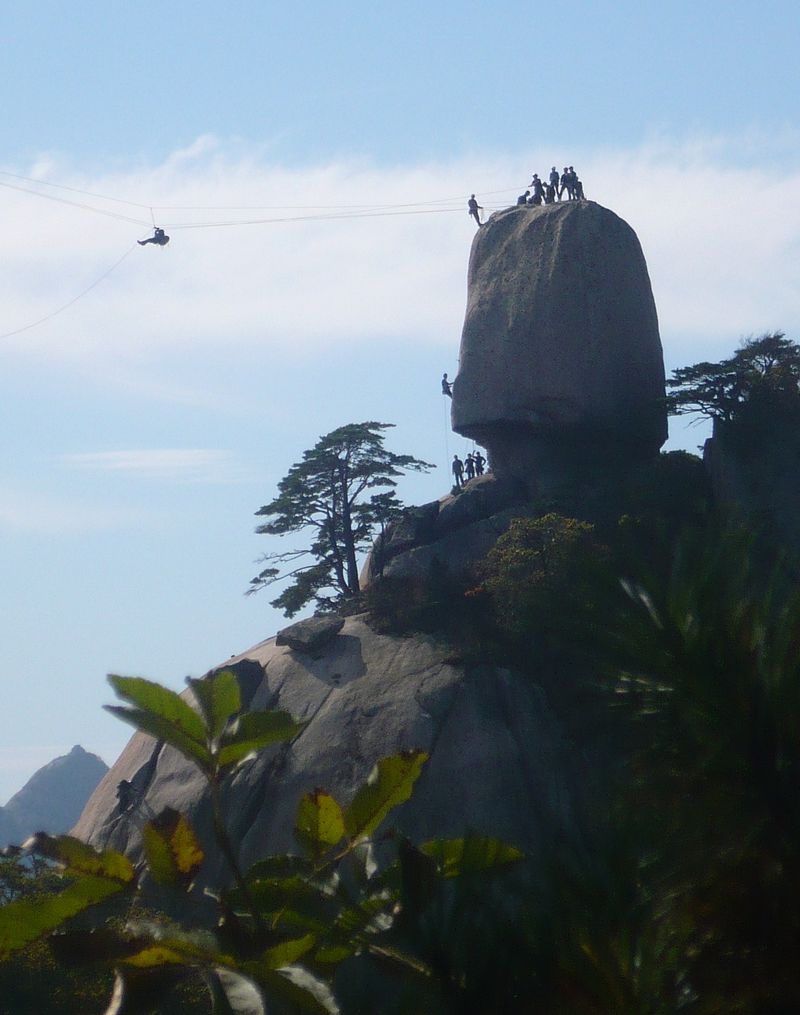
![]()
Caveat: 북한산
Caveat: I saw a butterfly in Hwajeong
Caveat: Benito Juárez en Seul (y ¡que pasen feliz 開天節!)
Have a happy 개천절! Here’s a statue of Benito Juarez (the “Abraham Lincoln” of Mexico) that I found on a side street in Seoul. Odd. But interesting.
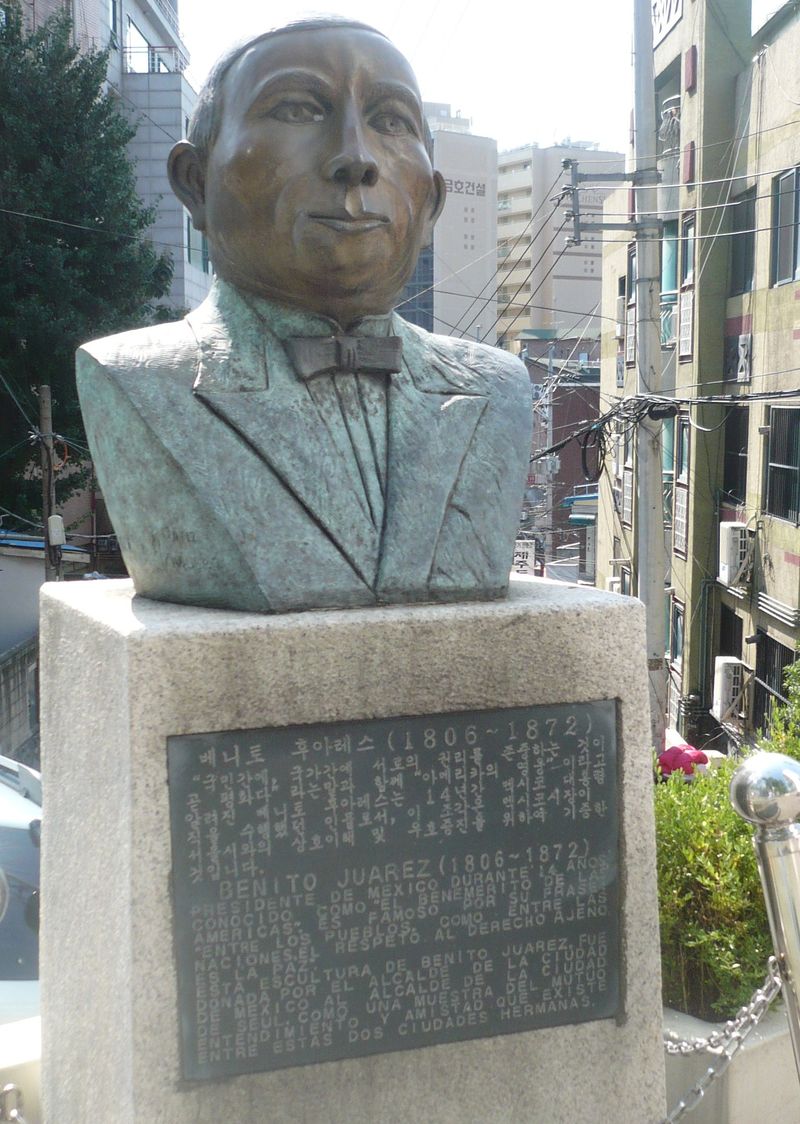
![]()
Caveat: Kowloon
I don’t feel like dwelling on the present. Here is a view from my hotel that I snapped in Kowloon (Hong Kong) on August 30.

![]()
Caveat: Hint of Autumn
I had to go to a special office of KTF (my cellphone provider) because they wanted to cancel my service because their records showed I was no longer a legal alien – I had to prove my visa and residency permit had been renewed. It was all very bureaucratic. I was mostly unable to communicate with the various people I dealt with, yet I succeeded in conveying the issue through a combination of showing them paperwork, gesturing at various spots on the paperwork, and isolated phrases in Korean in the style of: 문제를 있습니다 (problem [I] have-FORMAL).
The office was near the 백석역, and after my hour of patient waiting and courteous nodding, I could’ve taken the subway back home, or even a taxi – it’s only 3 bucks for that distance, typically. Nevertheless, I decided I needed some exercise, so I walked back home instead. It was very sunny, and because today was the day after a major holiday, there was still a festive mood in the air and a lot of people had the day off and were doing things like shopping or lazing around socializing in sidewalk settings.
I saw a tiny hint of autumn, in the bushy bit of yellow embedded amid the latesummery green of the trees. You can make it out in the exact center of the photo I took with my now once again contractually functioning cellphone.

![]()
Caveat: Hiding it
Well, I must be hiding my displeasure with my work situation well. One of my students said in class today, “oh, teacher, you’re always smiling.” I said, disbelievingly, “really?” I really don’t see myself that way. Most of the rest of the class concurred, though there were some holdouts. Nevertheless, I was surprised and pleased that I was perceived that way. My students do generally make me feel pretty happy.
Below is a picture of a building I liked in Hong Kong.

I’m watching Senator Obama being interviewed on Letterman (time-delay of the Sept 10 show). He’s very articulate… you can almost see him working hard to talk “dumber” so as to be more of an everyman, but he nevertheless manages to bandy about words like “connote” carelessly.
![]()
Caveat: 서버를 찾지 못하였습니다
I’ve really been struggling the last few days. Heads down with respect to the overwhelming aspects of the job I’ve committed to. As I’ve mentioned, I can’t even complain that I didn’t know what I was getting into. Well, so, I ‘m just “heads down” and pushing ahead. Work work work.
The picture shows a sign I saw, walking in Seoul on Saturday from Oksa station through the “embassy” neighborhood (I saw 7 embassies) to Itaewon, where I picked up a book I’d ordered at the English language bookstore that’s there.

-Notes for Korean-
서버를 찾지 못하였습니다=server not found
![]()
Caveat: Speaking of Mad Cows…
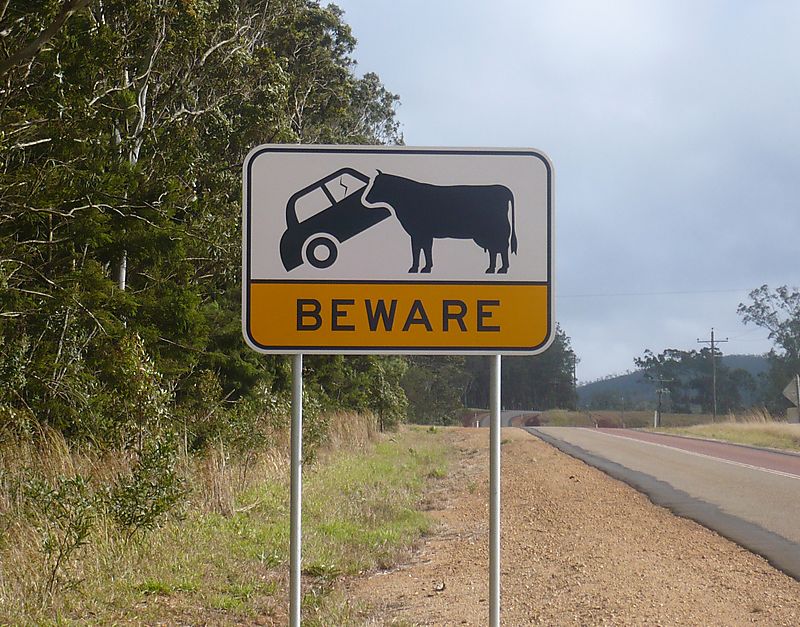
I saw this sign on the road between Ravenshoe and Atherton, in Queensland, Australia. That’s the sort of cow you need to beware of.
-Notes for Korean-
지금 나는 단지 우정을 찾아요. now I only friendship seek.
아빠보다 엄마가 단순해=mom is simpler than dad (easier to
understand or get along with, I guess)
단순=simple
단순해=is simple
-보다=more than
일하고 있어요=I’m working (progressive)
재치=wit, cleverness, tact
똑똑=drops, dripping
진실=truthfulness
따뜻하다=mild, genial, warm
한국말을 연습하고 싶어요=I want to practice Korean language
편안하다=peaceful, tranquil
![]()
Caveat: Commodities vs Knowledge Products
I was reading an editorial in the Fortune magazine dated September 15, written by Geoff Colvin, entitled “Brains vs. Brawn.” He was pointing out the way that raw materials and low-tech, mass-produced commodities (e.g. gold, petroleum, steel, food) have been massively outperforming knowledge-based, intensely engineered/designed/creative products (e.g. computer chips, luxury automobiles, movies) in terms of prices, over the last decade. He argues that despite this, he remains committed to an apparently earlier elaborated prediction that over the long-term, knowledge-based products are a much better investment prospect.
I’m not an economist. I’m an English teacher in Korea, with a training in linguistics and Spanish Golden Age literature. But I adamantly disagree. I think it should be obvious that over the real long term, commodities will always go up in price, but there is no such clear guarantee with respect to the prices of intellectual property (i.e. knowledge-based products). The reason is simple: we will not ever run out of the products of our intellects, collectively speaking. There is no underlying scarcity. You can keep making more ideas, art, designs, inventions, indefinitely. It’s historically cumulative. Meanwhile, commodities are physical things, and we are en route to running out, if not right away, eventually, for everything: gold, oil, iron, food. Or whatever.
It seems elementary that the solution to reconciling the conflict between market capitalism’s requirement for never-ending growth and the world’s evident physical limits is to always increase the “knowledge” component of our economic activity, while limiting and creatively reducing our need for and consumption of physcial commodities of all kinds. The additional advantage of this process, which comes almost as a side-effect, is that people seem actually to prefer “knowledge-based” (i.e. creative) labor. This is the inevitable rise the creative classes.
But from a strictly “futures” – which is to say, investing – standpoint, it seems to me that the place to make bets is on those same commodities that I believe so strongly we should be working to limit the consumption of. And, to reference that very much under-appreciated, 19th century, amateur economist, Henry George, all commodities and therefore all our society’s future wealth comes from the control of real estate (broadly interpreted to include oceans and even “outer space” in today’s day and age). George used this to argue that land was the only thing the state should or could legitimately tax. I’m not sure I agree–I don’t completely understand it. But it makes a weird kind of sense.
The picture is of a waterfall near my mother’s home in Australia. A taxable waterfall?
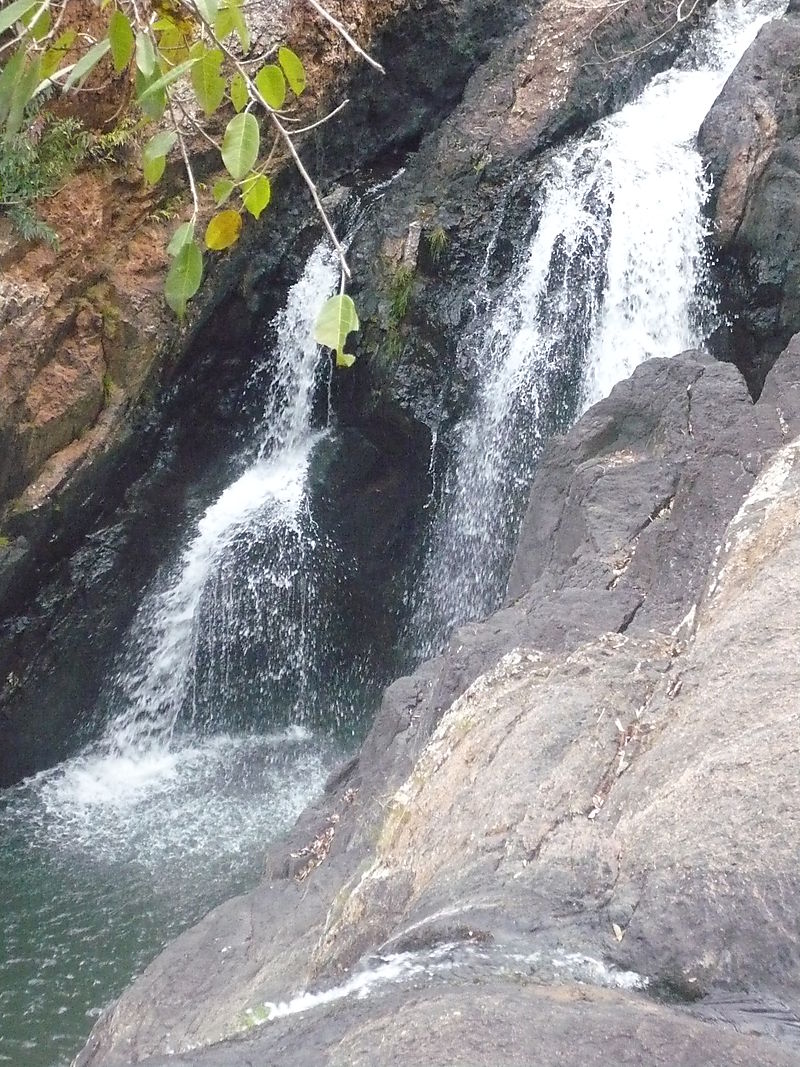
![]()
Caveat: A View
Hmm. Why am I so exhausted, these last few days? Maybe an aftereffect of my travels to Australia and HongKong. Anyway… not much to write about. Work is demanding a lot of hours, as I knew it would upon getting back. Nothing unexpected or unpleasant, just a lot to be done.
I took this picture on the Kuranda road (Kennedy Highway) on a turnout driving down from Mareeba to Cairns last Friday.
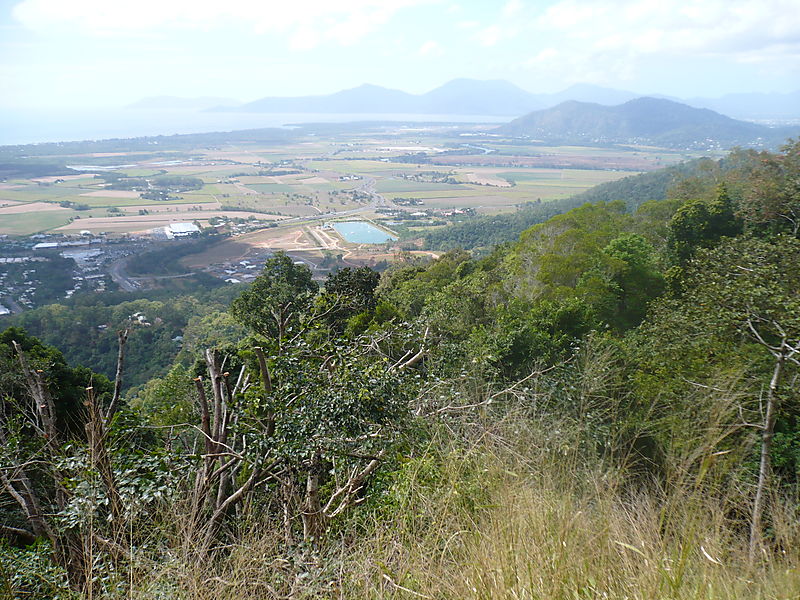
-Notes for Korean-
기분이 어때요?=how’re you feeling?
그것 때문에 똥쌌다=”I had a hard time of it” (very vulgar, literally “because of that I took a shit”)
지루해요=it’s tedious / I’m bored
![]()
Caveat: So this is home
I’m back home in Ilsan. And going away, then coming back – that kind of makes it feel more like home, strangely.
A picture from Hong Kong. More forthcoming. I really like Hong Kong. I definitely want to go back and spend more time there.
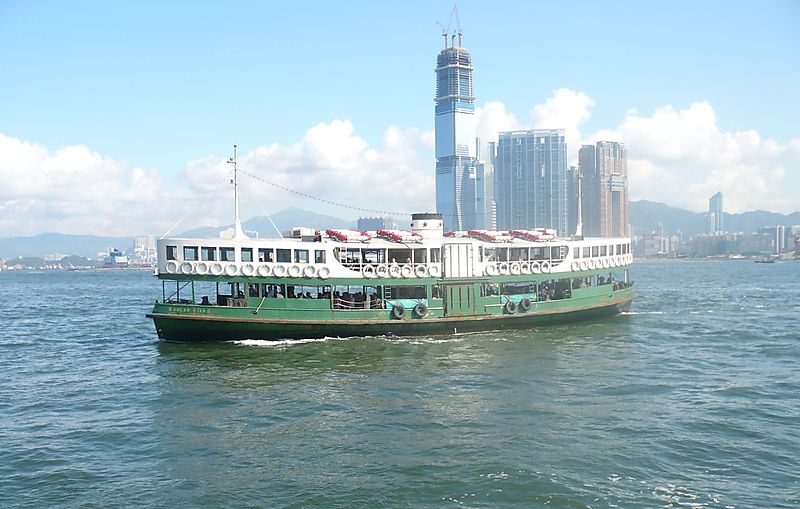
![]()
Caveat: Hong Kong
I’m in Hongkong overnight, returned from Cairns today. The flight was OK, despite the noisy baby in the row in front of me.
Hong Kong is essentially the opposite of rural Queensland, by any standard of comparison: population density, first and foremost. I have a pretty posh hotel, here, in the Kowloon area. I’ll go exploring tomorrow and then fly back home to Seoul, and post some more.
Here is a picture of Val (my mother’s good friend), me, and Ann (my mother).
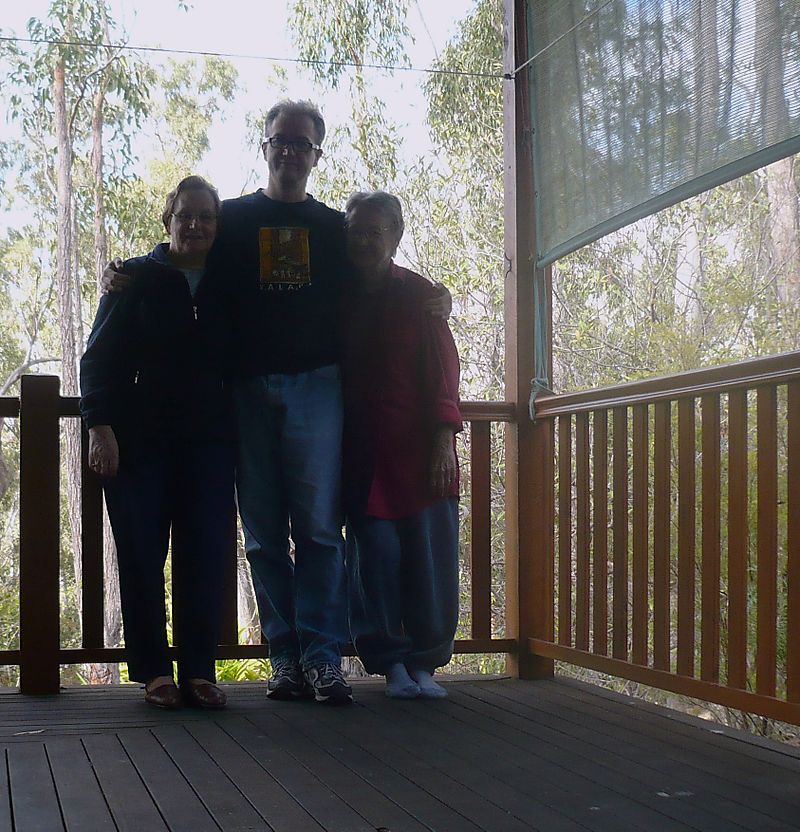
![]()
Caveat: Quilts
I spent a good portion of the day today driving around with my mom and her friend Val (who’s visiting from Apollo Bay, Victoria) meeting some of my mom’s friends who she does quilting with. I saw a lot of artistic and beautiful quilts, both in-progress and completed.
Here is a picture of my mom standing next to my bright orange rental car that I drove up from Cairns, parked in the carport beneath her house.
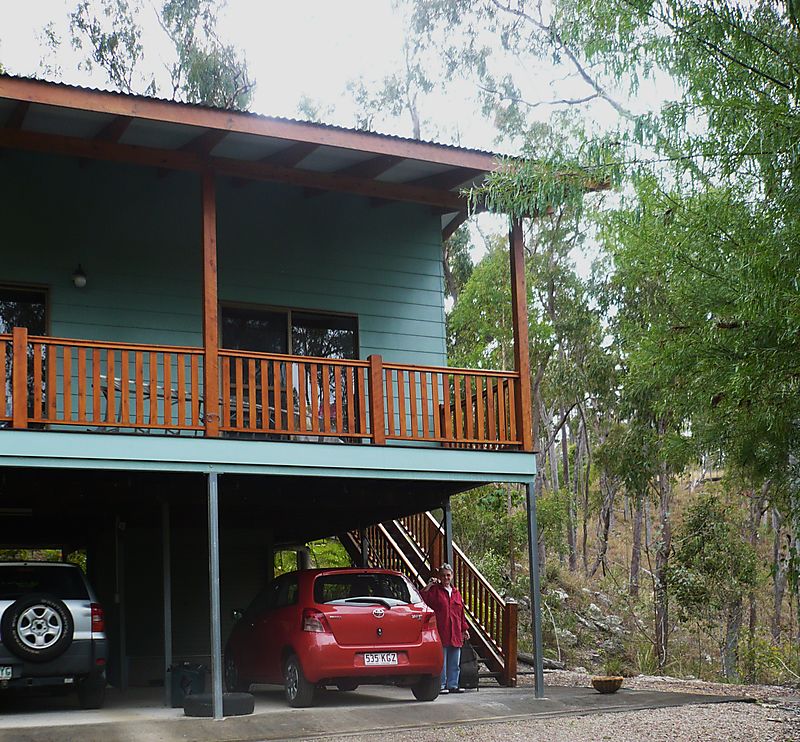
![]()
Caveat: Ockers?
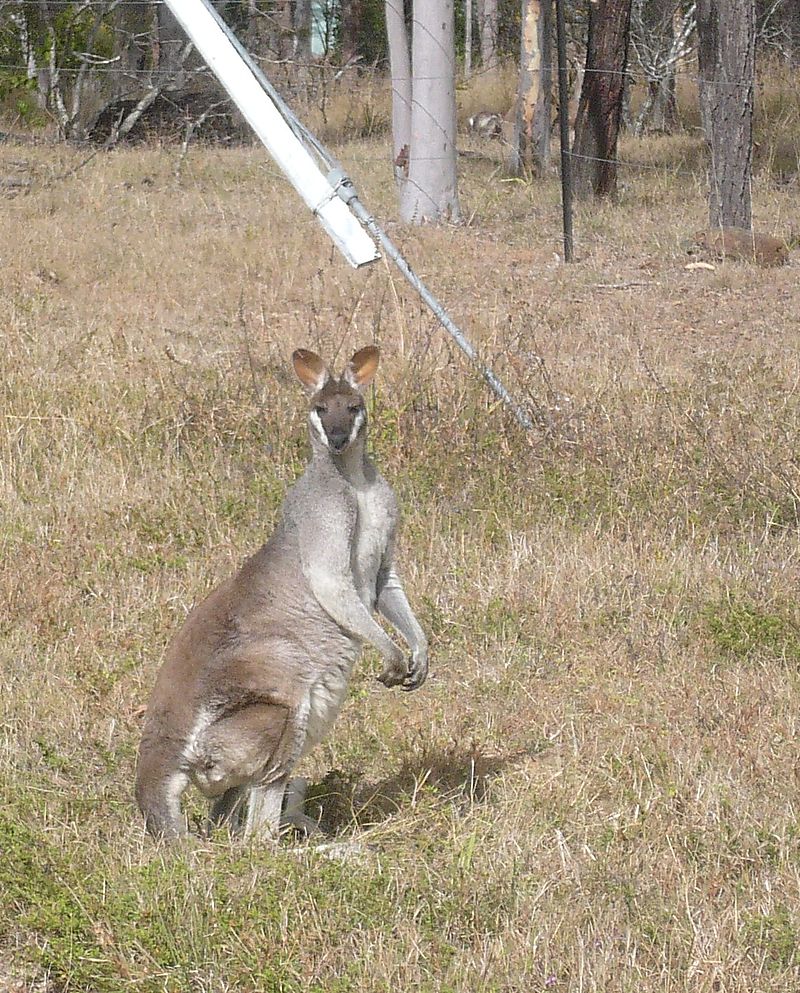
My flight to Cairns was diverted by a Typhoon, so instead of changing planes in Hong Kong I switched in Brisbane instead. I picked up my rental car in Cairns at around noon instead of the scheduled 8 am. I was rather tired, but I managed the drive up the hill (via the Kennedy Highway through Kuranda, Mareeba and Atherton and, after getting lost on the road leading to my mother’s house, I arrived at 3 pm or so.
I realized that if I’d driven the same amount of time at the same speeds in South Korea, I’d have nearly crossed the country, diagonally. Australia is a huge country, and very sparsely populated. I have been in a strange sort of culture shock since I got here – much stronger than during my previous two visits to Australia. I think it has to do with having come here after living a full year in Korea – my previous visits had been coming from the U.S., which really isn’t that culturally different from Australia, when you get right down to it.
For one thing, both countries have lots of ockers. But in the U.S., we call them rednecks, I think. Or some word like that… I’m not sure that’s the right translation. “Ocker” is an Australianism, and means a boorish and annoying person, from what I’ve gathered. My mother used the term to complain about the idiotic patrons in a store she’d been in, I think. I like the word, anyway. Maybe I can find an excuse to teach it to my students.
In the first picture, you see a wallaby. They congregate at the top of the hill above my mother’s house, where the driveway starts at the dead end of the road. In the second picture is a friend of my mother’s named George, a female kookabura, who often comes to visit seeking handouts and snacks.
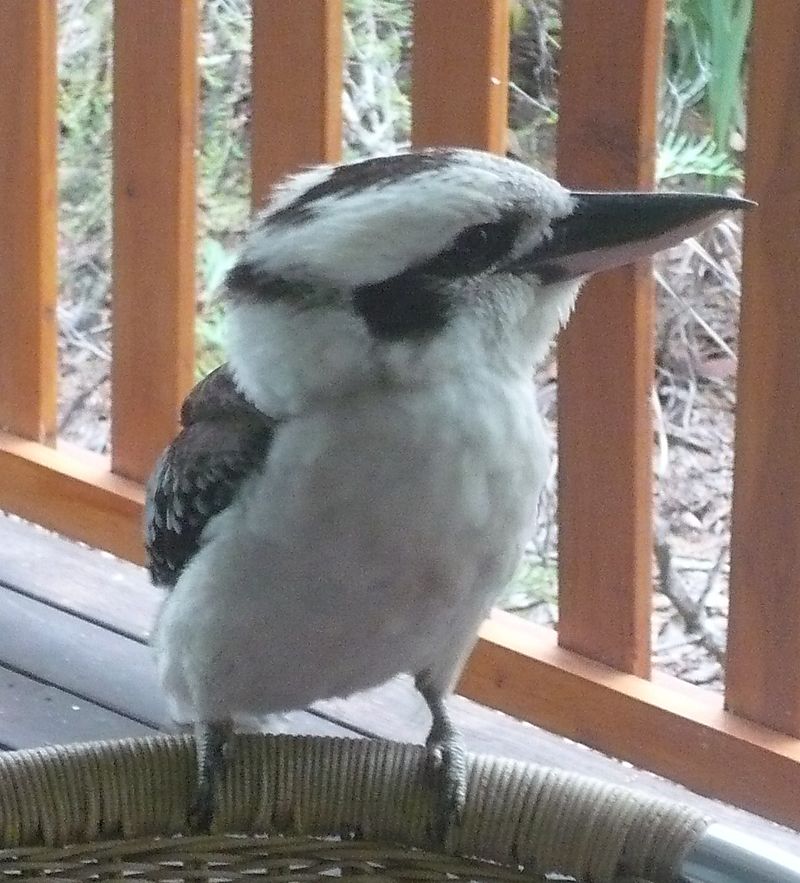
-Notes for Korean-
외국에서 살기가 재므있을 것 같다.
=”seems like it’d be fun to live abroad”
잘 하기는요=”Ha, I do it well? Not really.” (very idiomatic translation)
![]()
Caveat: 120 Essays
I’m off for a week, now. I fly to Australia tomorrow. I have about 120 student essays to correct–which gives me something to do on the plane journey, I guess.
It rained most of the day today, and it was cooler… It was nice. After work got out, I had dinner with Curt and we talked about his plans for his academy that he’s trying to build. I hope he is successful… I felt a bit badly about having rejected his offer for ElBeuRitJi’s, especially with those essays weighing down my backpack. But… that’s life, right?
Curt spent some time talking about 정 (jeong), about how it was a Korean concept that had no direct parallel in English. It definitely seems to have a lot of possible translations: naver.com’s online dictionary says “feeling, emotion, sentiment, love, affection, passion, human nature, sympathy, compassion, heart” among other things. But I don’t think it’s that inaccessible a concept. Curt feels strongly that Westerners are too dominated by practical and excessively rationalist tendencies, while Koreans are guided by emotion. I don’t think this is true, but I have a heard time trying to argue with him about it, so I tend to just nod and reflect on what he’s saying. I guess I’m always more interested in what people of different cultures and backgrounds have in common than what separates them, so I’m always seeking commonalities, maybe.
Below is a picture of the shiny metallic-looking Jeongbalsan police station tower, as seen (through some other buildings) from a parking lot a block west of my apartment building. It looks a bit like a grounded rocket ship from a 1930’s-era movie.
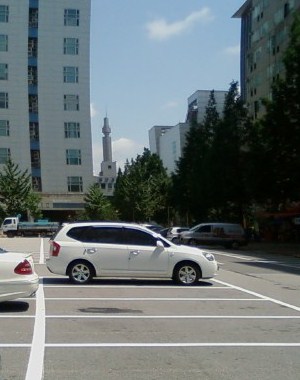
-other Notes for Korean-
In other notes: 뜻이 있는 곳에 길이 있다=”where there’s a will there’s a way”
뜻=aim, intention
![]()
Caveat: 드르르
My current favorite Korean word is 드르르 (government romanization deureureu, IPA /tɯɾɯɾɯ/). Although I’m not quite sure how to use it smoothly. Er… that’s what it means: “smoothly, swimmingly.” Something like that. I love the sound of it. The way it sounds like you’re beginning to hum some great musical trope or something. Duh-ruh-ruh.
I went to KINTEX this morning. KINTEX is a giant convention center, but every Wednesday the Uijeongbu area Immigration office (which handles the northern half of Gyeonggi province) sets up a help desk for all the foreigners in the Ilsan area, so they don’t have to trek to Uijeongbu to get their paperwork dealt with (40 minutes in on one subway line, then 40 minutes out on another is the most plausible way to make the trip, I would guess).
I got the reentry visa and paperwork worked out for my trip to Australia next week (leaving this Saturday). The matter went smoothly. There: 드르르 진행되었어요. I used it!
That date has crept up very fast. Of course, with my last-minute negotiations over the contract renewal and all, I actually only bought the tickets last week. So not that fast, really. It’s ending up being a last-minute thing all around.
I took the taxi to KINTEX–it’s less than 3 bucks, so no big deal. Then I decided to walk home. The sky was deep cerulean. The weather’s been hot, still, but much less humid, and so there’s not much haze in the air, especially with a nice morning breeze blowing. There were huge puffy lumps of cobalt and chalk cruising the skies randomly, looking for something to rain on. I zig-zagged through the narrow grid of the kburbs somewhat aimlessly, knowing my general direction.
I felt extremely aware for once of what a huge metropolis I’m living in – I’m on the northwestern corner of one of the largest metropolitan areas in the world, by population. I could travel east, south, or southeast for over an hour and still be in neighborhoods identical except in specifics. West and north are different – 15 minutes west is the estuary of the Han River, and beyond that some islands and the Yellow sea and China. 20 minutes north is the most militarized border in the world, and a socialist workers’ paradise, I think.
Caveat: 내가 고추룰 봤어요
A common enough sight, this time of year: red hot chili peppers lying around on the sidewalk, drying and becoming delicious. I think people must grow them on their balconies and rooftoops and things… although there do seem to be quite a few community gardens around, too.

![]()
Caveat: Hundertwasser
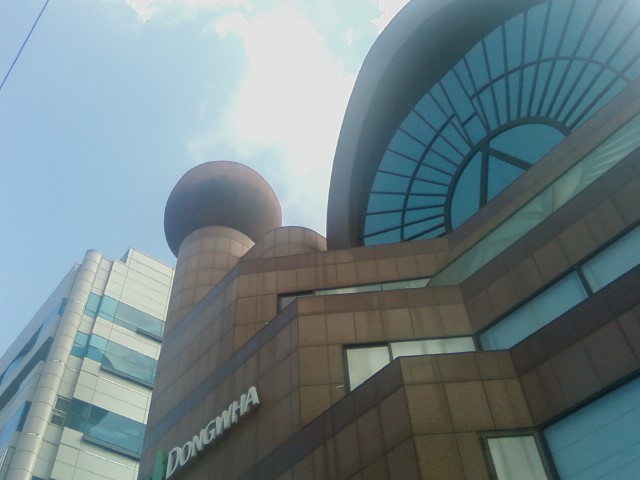 I was surfing wikipedia earlier and discovered an Austrian architect named Hundertwasser I’d never before heard of, but whose work is very interesting to me–in the same vein as Gaudi, I’d say. The building at right is not by him. But it shares a few stylistic elements.
I was surfing wikipedia earlier and discovered an Austrian architect named Hundertwasser I’d never before heard of, but whose work is very interesting to me–in the same vein as Gaudi, I’d say. The building at right is not by him. But it shares a few stylistic elements.
I wonder if one can become a successful architect late in life? Has it ever been done?
When I was a child, I was certain I wanted to become an architect, and I held fairly fast to that ambition until the summer after my graduation from high school. I worked for a civil engineering office and became intimidated by the sheer magnitude of number crunching that successful structural design seemed to involve. And I was too committed, at that time, to understanding not just the design ideas but the engineering principles to even consider become an “art”-type architect (i.e. one who doesn’t do the engineering parts). And from that time until now, I’ve never had much clarity of ambition.
-Notes for Korean-
context: a song lyric
이런=such, such..as, of this kind
마음=idea, thought, mind,
이런 내 마음 알고 있나요
=such my thought understand-PROGRESSIVE-CONJECTURE-POLITE
=[?] I wonder if I am understanding
고백=confession, admission
![]()
Caveat: My subway station
Caveat: 과연 외로움은 상처보다 견디기 쉬운것일까?
Yesterday, with my extra day off, I met Basil in Gangnam and ate some delicious very authentic-tasting tacos al pastor – they could’ve come from a street vendor in Mexico City. I felt happy.
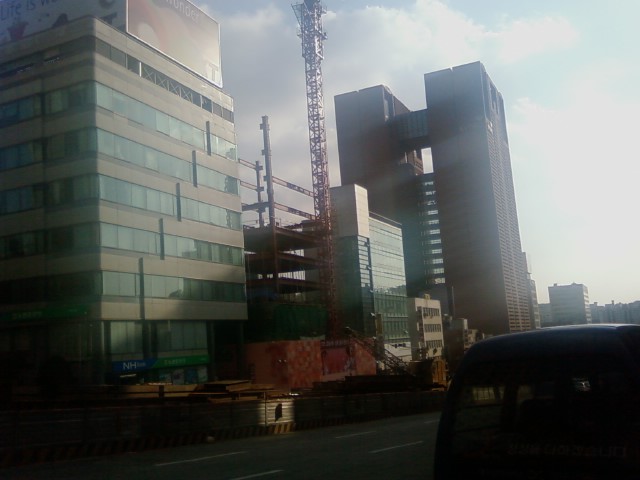
Today was more melancholy. Time is running out on my never-ending vacilation/procrastination regarding my decision to stay with ElBeuRitJi or not. I hate the fact of having to make decisions like this. If you just read my blog entries, you will conclude that I’m not very fond of ElBeuRitJi. And that’s true. But there are factors that encourage me, nevertheless, to want to renew. The primary one being that I’m craving some stability and/or predictability at the moment, and I am finally feeling somewhat pleased with the progress I’m making on my efforts to learn some Korean, so to throw things up in the air to see where the land, just now, feels like “running away without a good reason.”
Anyway, nobody will want to read too much about my angst. Let’s just say, by the end of the week, I’ll know for sure if I will be staying with ElBeuRitJi for another year or if everything will be up in the air come end-of-August, with who-knows-what coming next.
In other news… “Go-Stop” is a ubiquitous card game Koreans seem obsessed with–scenes involving people playing this game appear everywhere in movies and dramas on television. I am trying to learn more about it. Rules: https://www.pagat.com/fishing/gostop.html
-Notes for Korean-
context: random notes
매일=everyday, daily
메일=email
날=day
괴물=monster
어린이=child
싫어=”Nope” or “I won’t do it” (a bit rude I think)<=싫다=to be disagreeable, to be unwilling, to be unpleasant
-보다=[comparative particle ending] “…than…”
-네=”and family” after a name, e.g. 달자네=Dalja and family
context: reading a transcript alongside a tv drama
과연 외로움은 상처보다 견디기 쉬운것일까?
=indeed loneliness-TOPIC injury-than bear-GERUND easy-thing-COPULA-CONJECTURE
=”can it be that loneliness is easier to bear than pain?”
context: a web advertisement for a game
재미없으면 보상해드립니다!=”if you are not amused, you get a refund!”
I’ve decided to add this to my blog’s tagline, for a while. The breakdown:
보상=reward, compensation, recompense, refund(?)
드리다=[DONATORY auxiliary verb, HONORIFIC BENEFICIARY]=give, let, set, make a present of something to someone… preceded by V+어/아/여
cf. 주다=[DONATORY auxiliary verb, HUMILIFIC BENEFICIARY]… also preceded by V+어/아/여, which we use all the time to make requests…
… these are a case of a HONORIFIC/HUMILIFIC lexical pair, I think.
Just below, in the ad:
그걸과!=…I have no clue what this means, exactly; 그거-(<=그것) can be “that, this,” but what’s that embedded -ㄹ-? an OBJ ending? 과=and, with, against; but that means the phrase has no verb… is that OK? it would mean something like “against that!” doesn’t sound quite right…
context: reading the labels of household products
곰팡이=mold, mildew
![]()
Caveat: 빌코멘 오바마
I was riding the subway, and looking at a newspaper over a man’s shoulder. There was a big headline, that read “빌코멘 오바마” (bil-ko-men o-ba-ma). And there was a picture above the headline, that definitely gave away the second word – it was a certain popular American politician. The first word took a few more seconds to puzzle out. But I’ll give a clue – that certain American politician was giving a speech in Germany. So, I’ll let you polyglots out there decipher what that first word is – it’s not Korean.
I decided to do some random exploring. I got off the subway at 독립문 (Dongnimmun). I wandered around the neighborhood, with a vague idea of trying to go up over the mountain to the southwest, toward Sinchon past the Geumhwa tunnel, but the moutain didn’t appear to have footpaths over it – at least not from where I went.
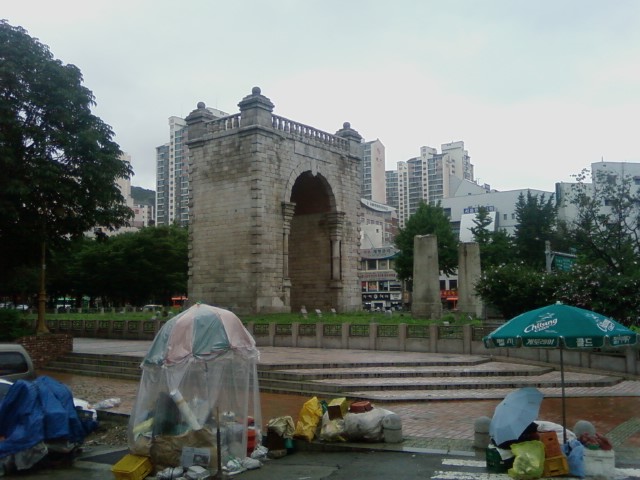
One odd thing I noticed was when I looked up at the Independence Gate (which is what 독립문=Dongnimmun means), and I saw written there, very clearly, 문립독=Munipdok… which is to say, the three hangeul glyphs are in reverse order! Why does the gate have its name written backwards, on it? I have two speculations. First, it’s because I was looking “out of” the gate – I was standing to the east of it, meaning closer to downtown, and the gate was on the western side of the old city, so, the side I was looking at was the “inside.” So maybe the name was written backwards to match up with what was written on the other side? The other speculation is that maybe it has to do with Chinese word order? I couldn’t find a solution to the mystery through any googlings. Anyway, I took a picture of the gate, but the backward hangeul at the top of the arch doesn’t show up very well – the resolution wasn’t good enough on my phone’s camera, I guess.
I got on a bus randomly, and it did in fact take me toward Sinchon. But in the meantime I’d lost interest in trying to get to Sinchon, and had become fixated on making my weekly visit to a major bookstore. So I got off the bus when I saw a station on the number 5 subway line, and rode it two stops to Gwanghwamun, where there’s a big Kyobo bookstore. Too big – I like the one in Gangnam better. This one was a freakin zoo, it was so crowded. Maybe it was because of the rain. I bought a few magazines and one book, and left much more quickly than I normally do.
I have spent some time messing around on naver.com, trying to become more comfortable and proficient navigating the internet in Korean. I found a great posting (in English) that someone did on the basics of how to use naver.com, Korea’s number one internet portal. In any event, I can now proudly say that I have a Korean email address – to go with all my other email addresses! It is jaredway [at] naver.com.
-Notes for Korean-
context: surfing naver.com
만들다=make, create, so… 만들기=[a button on a website, “create!”]
…and therefore, “하느님께서 태초에 천지를 만드셨다” “in the beginning, God created heaven and earth.”
On seeing this, I got curious about the Korean word for God. There are two words which have different origins but are (in)conveniently quite similar in pronunciation (which creates confusion and/or clarity depending on one’s attitude towards semantic ambiguity, right?):
하느님(haneunim)=god as a traditional “lord in heaven” and mentioned even in pre-Christian Korean literature, and, e.g., the Korean national anthem. It comes from 하늘(haneul)=heaven, sky… hence, “sky guy [honorific]”
하나님(hananim)=a capitalized, monotheistic God, “number one guy [honorific]”
…
성격=personality, type
열린=open, unlocked
닫힌=closed… from 닫히다=close, shut
숨은=hidden… from 숨다=hide
…
분류=classification
생활=livelihood, lifestyle
생활하다=live, subsist
-점(店)=a store;a shop
![]()
Caveat: “Notes for Korean”
Over the last month, I’ve been trying to get more serious and disciplined about my study of Korean. I have begun to keep little computerized notes, every single day, of interesting or useful vocabulary items, phrases, and things like that. But I’ve reached a point where I have compiled enough of these that they’re becoming difficult to keep organized; more importantly, I sometimes go looking for something I know that I put into a note, and cannot find it. Also, some of these things are things I would love to have found by searching online, in the same way that I have found other similar things.
Because of all of that, I have decided that it might be useful to post these daily notes and observations about Korean as a kind of footnote to each day’s blog entry. This will make them searchable by not just me but by anyone – although it won’t improve their level of organization. But with google, who needs organization? – just let the spiders crawl around and find it, right?
So, starting today, I will include a little, disorganized spattering of notes somewhere in each blog entry. Most of my regular readers (how many are there, really? 3? 2?) will not have much use for this, but they’re mostly going to be there just for myself, as it’s a convenient and logical place to put them – I’ll be able to access them anytime I need, and I’ll be able to search them, too. Further, by compiling them I’m helping myself to remember them, and I can express my joy at trying to make sense of this fascinating yet difficult language.
-Notes for Korean-
context: my cellphone’s “phrase of the day”: 식품 매장이 몇 층에 있는지 알려주실 수 있습니까?
매장 =department, floor (as in a dept store), store
so: 식품 매장=food floor, food court
and: 알리다=know, tell, inform, notify
context: episode 13 of 쾌걸춘향, 춘향 says to 몽룡, “금해애애!” (approximately) = “stop thaaaat”
금하다 =refrain, prohibit, or (idiomatically) stop doing something
In researching this online, I also found an interesting double negative:
…-ㅁ을 금할 수 없어요 = [I] can not stop myself from …
context: deciphering instructions in a student textbook
풀이 =explanation, clarification
찾다= seek, search for, spot
발견 =discovery, revelation
발견하다=find, discover
context: conversation of words with a coworker
나륵풀=basil (the herb)
풀=grass, herb, plant, pasturage, weed
context: trying to figure out instructions on a korean website
지나다=pass, spend, elapse… etc. (I should know this – it’s lesson 1 in most Korean-as-a-foreign-language textbooks!)
사용=use, employment, appropriation
복사=reproduction, copy
주소=address
똑=exactly, precisely
소리=noise, sound, talk, word
끝=end, conclusion
처음=first, beginning, start, cf. 첫
도우미=helper, wizard (in computers)
정보=information, report
닫다=close (close button says 닫기)
당신=a special word meaning “you” (I should know this)
context: vocab words for “blue” class
discover (v)=발견하다
energy=정력, 에너지
forecast=예보
shed (v)=벗다
source (n)=원천
stay (v)=머무르다
put on (v)=입다
until=-까지 (nominal ending)
spot (v)=발견하다, 찾다
always=항상
have seen / haven’t seen=본적 있는 / 본적이 없는
Meanwhile, in other pursuits… I rediscovered a Portuguese poet named Fernando Pessoa, who apparently wrote criticisms of his own poetry under alternate pseudonyms (heteronyms). This is interesting, cf. Borges. I vaguely recall running across him before, but, if so, I completely forgot him. I was reading the Portuguese-language wikipedia article about him, just to entertain my linguistic fancy, I guess – keeping myself challenged, and all that. And under the Spanish-language article on him, I found the following pithy observation about Pessoa by Octavio Paz: “nada en su vida es sorprendente, nada excepto sus poemas” (nothing in his life is surprising, nothing except his poetry).
Quote of the day:
“Tenho o dever de me fechar em casa no meu espírito e trabalhar quanto possa e em tudo quanto possa, para o progresso da civilização e o alargamento da consciência da humanidade.” – Fernando Pessoa
 Pessoa is perhaps best known in the English-speaking world for his last words: “I know not what tomorrow may bring.” I’m sure others may have said these words as their last, too, but he’s the one to whom the quote is generally attributed. It’s notable that he, in fact, wrote them rather than speaking them, as he was unable to speak at the time. And it’s also worth noting that they were in English, not Portuguese, since English was a second native language for him, because he’d spent much of his childhood in South Africa.
Pessoa is perhaps best known in the English-speaking world for his last words: “I know not what tomorrow may bring.” I’m sure others may have said these words as their last, too, but he’s the one to whom the quote is generally attributed. It’s notable that he, in fact, wrote them rather than speaking them, as he was unable to speak at the time. And it’s also worth noting that they were in English, not Portuguese, since English was a second native language for him, because he’d spent much of his childhood in South Africa.
![]()
Caveat: Dioses Antropófagos Barsonianos
Hoy mañana tuve que ir a Seul, a la embajada estadounidense para intentar arreglar la cuestión del papeleo de mi visa.

La foto muestra la gran avenida que está directamente en frente de la embajada imperial. A veces cuando me meto en el metro, llevo un pequeño libro que encontré en una librería en Minnesota, que es una versión en español del segundo libro de la serie marciana de Edgar Rice Burroughs: Los dioses de marte. Me gusta leer el libro en el metro porque tiene apariencia de algun librito devocional, y no pinta de ciencia ficción.
En el libro leí estas palabras de la princesa Faidor, hija de Matai Shang: “Pues si los hombres pueden comer carne de animales, los dioses pueden comer carne de hombres. Los Sagrados Therns son los dioses de Barsoom.”
Bien, la teofagia es la práctica de comer dioses (digamos, simbólicamente, por ejemplo en el eucaristo cristiano). Pero parece algo interesante y raro la idea de dioses antropófagos, ¿no?
![]()
Caveat: After a Rainstorm
I really like the sky in this picture. I took it earlier today in Seoul, near Guro station, right as a rainstorm was ending.
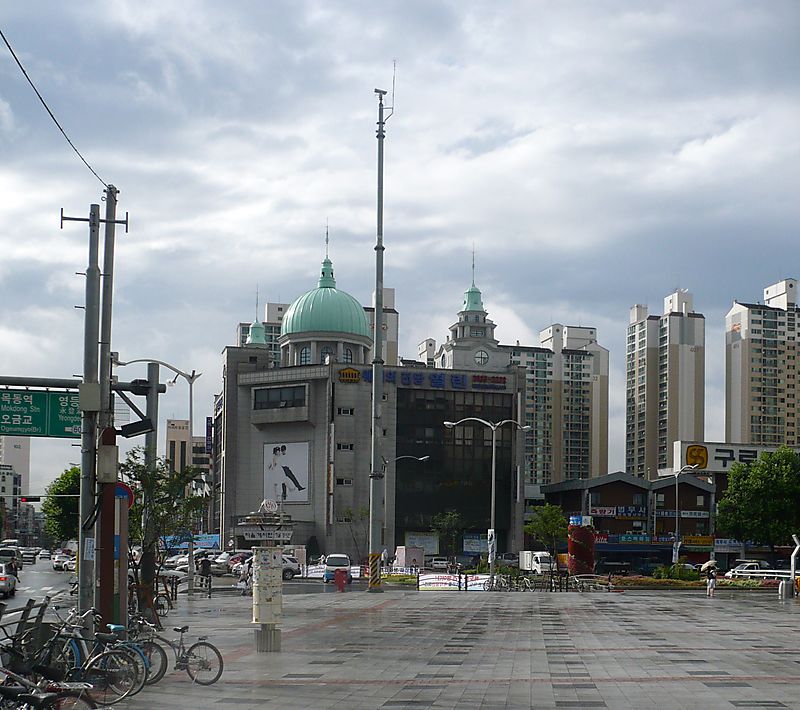
![]()

